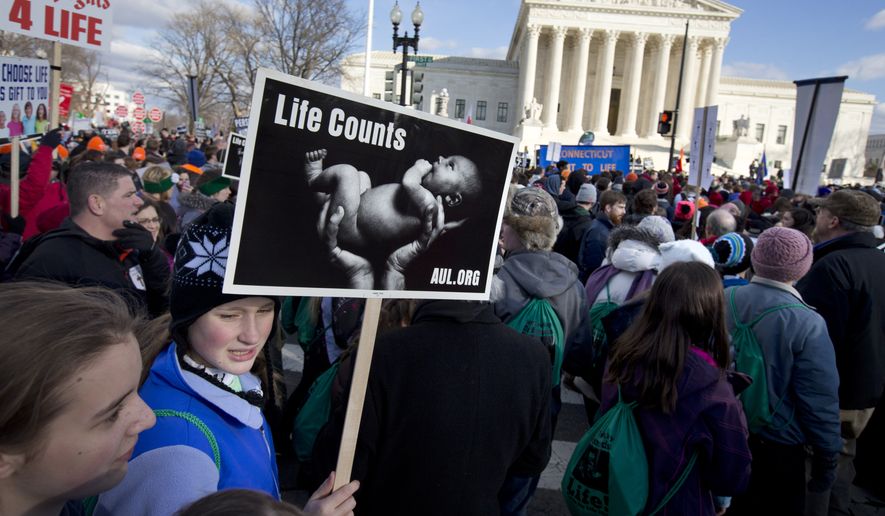A trio of South Dakota lawmakers presented a state-passed legislative resolution to the Supreme Court on Tuesday that asks the high court to reconsider — and overturn — its abortion rulings, including Roe v. Wade.
“We believe … there is significant, documented evidence that women are being harmed” by the Roe v. Wade and related abortion rulings, “and we would like the Supreme Court to look at that,” South Dakota State Rep. Lynne DiSanto said Monday.
She and State Reps. Roger Hunt and Kris Langer brought House Concurrent Resolution 1004 to the Supreme Court clerk’s office Tuesday morning.
The 15-page measure this year passed the South Dakota state House of Representatives with a 60-10 vote and state Senate with a 25-9 vote. It is signed by the leaders of both chambers.
The measure — which is unprecedented, the three lawmakers told The Washington Times — says state officials are blocked from doing their sworn duty to protect “intrinsic rights” of children and women because of federal laws dictated by Roe.
It also lists nine grievances the state lawmakers have with the Roe ruling, including its “tragic errors” of legal analysis and factually wrong assumptions. It then asks the high court to choose an abortion case that “most properly presents the important issues,” and use it to reassess Roe and its progeny “and overturn them.”
“The right and duty to preserve life cannot co-exist with a right or duty to destroy it … and long ago our law was required to choose life over death,” the measure says.
The measure further notes the fallibility of the Supreme Court, and how it has overturned “no less than 233” of its prior decisions “because they had been incorrectly decided.”
These corrective actions demonstrate that “the Court must always be vigilant and introspective in revisiting past decisions when errors are brought to its attention,” the measure says.
Planned Parenthood of Minnesota, North Dakota and South Dakota (PPMNS), the primary target of much of the pro-life legislation the lawmakers have passed, had no immediate comment.
However, PPMNS decried South Dakota lawmakers’ efforts to pass the concurrent resolution and urged people to sign a petition saying, “I want my elected officials to stop interfering in personal medical decisions.”
South Dakota media noted that the resolution is “completely nonbinding” and that in 2006 and 2008, South Dakota voters rejected measures that would have banned abortions except in limited situations.
Mr. Hunt said Monday that while he and his colleagues were not expecting a written response from the Supreme Court, they believe their resolution will be read and “carefully considered.”
The Supreme Court could also receive similar resolutions other states, he said, adding that he and other South Dakota lawmakers have been contacted about their resolution by officials in other states.
• Cheryl Wetzstein can be reached at cwetzstein@washingtontimes.com.




Please read our comment policy before commenting.